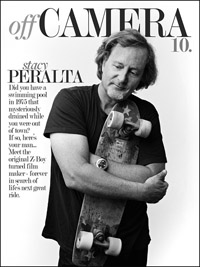 I have expressed my appreciation in the past for LJ Jeneski of Nonfiction Unlimited, the LA-based commercial production company that since 1995 has been built upon the idea of exclusively representing the planet’s best documentary filmmakers for commercial and creative assignments. We worked together over the period that launched us all into a very busy 2007, and I feel we accomplished a lot together. At that time, the company’s elite roster included directors Rob Bindler, Paul Crowder, Steve James, Robby Kenner, Barbara Kopple, David McNamara, Stacy Peralta, Earle Sebastian, Ondi Timoner and Jessica Yu. It was my introduction to most of these incredible talents, and through the process of updating bios and promoting their newest projects, I got to know many of them pretty well.
I have expressed my appreciation in the past for LJ Jeneski of Nonfiction Unlimited, the LA-based commercial production company that since 1995 has been built upon the idea of exclusively representing the planet’s best documentary filmmakers for commercial and creative assignments. We worked together over the period that launched us all into a very busy 2007, and I feel we accomplished a lot together. At that time, the company’s elite roster included directors Rob Bindler, Paul Crowder, Steve James, Robby Kenner, Barbara Kopple, David McNamara, Stacy Peralta, Earle Sebastian, Ondi Timoner and Jessica Yu. It was my introduction to most of these incredible talents, and through the process of updating bios and promoting their newest projects, I got to know many of them pretty well.
Among my early assignments was touching-up an already stellar bio for Mr. Peralta. Here’s a snip from that writing amalgam I can only take a little credit for.
So far, the life of award-winning documentary filmmaker, accomplished television producer/director and Nonfiction Spots commercial director Stacy Peralta is literally a Hollywood movie – or more precisely, several of them. One of eight storied pioneer skateboarders featured in his own Sundance Audience-Award winning documentary “Dogtown and Z-Boys” – which was later dramatized in Columbia Pictures’ 2005 feature “Lords of Dogtown” – his early experiences as a Santa Monica surfer and a renowned skateboarding revolutionary led to many momentous television and movie appearances and business developments. A partner in the hugely successful Powell-Peralta skate gear company, Stacy’s craftsmanship and style in directing the sensational Bones Brigade Video Show – which starred Tony Hawk, among others, and effectively laid the groundwork for the modern sports action video – captured international attention and spurred interest in his innovative directorial style. His work as a second unit director and technical advisor in television and feature films led to more TV projects as a producer/director. When the actual tales of the Z-Boys and Dogtown began making serious ripples in Hollywood, Stacy set out to make his own documentary, and succeeded with the sponsorship of Vans Shoes. Beyond winning the 2001 Sundance Film Festival’s Audience Award for Best Documentary Film, the Independent Spirit Award for Best Documentary and many other prestigious honors, the film also became a hallmark for the successful development of branded entertainment content – and landed Peralta on the roster of Nonfiction Unlimited.
I am embarrassed to admit that it has only been in the last week that I finally watched “Dogtown and Z-Boys” from start to finish; as you might imagine, I was blown away. Given my introduction to Stacy as a director, the story he carved-out so masterfully on the screen had the effect of lifting a fog from my vision, and making me realize that there was a lot more than I had ever known to what I had experienced. During our few years living in LA, I came to know Venice from a few angles… but in “Dogtown,” a riveting history is brought to life that I am ashamed to have been completely unaware of. I was actually among the jealous young kids watching Stacy on TV in “Charlie’s Angels,” and watching the early skateboarding competitions on ABC’s Wide World of Sports. Between those long-lost days and the recent night I saw “Dogtown,” the skateboarding phenomenon had exploded and soared to its present unbelievable heights. And while I had a few brushes with a couple of the instigators along the way – and I certainly counted myself lucky for each of those – little did I know how close I had come to the heart of the action. Watching that film, I realized the very cool guy I’d exchanged a couple of work-related emails with was living the life of my dreams: He made a film that educated and entertained in a bold style all his own, and he absolutely set a new standard for theatrical storytelling. Stacy Peralta, my hat is off to you.
Of course, in the 13 years since “Dogtown” seized the world stage, Stacy’s success story has continued to unfold. I also love the fact that Paul Crowder, who edited “Dogtown,” has also gotten his share of acclaim, become a director in his own right, and earned a starring spot on Nonfiction’s roster. I think it’s safe to say that the sensational editing of “Dogtown” (and the music!) makes every film school graduate stand up and cheer. Across the board, from Stacy Peralta to Paul Crowder to anything involving Nonfiction Spots, I sincerely look forward to seeing whatever you all come up with next.